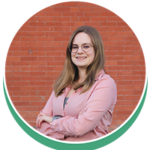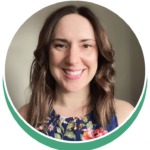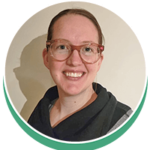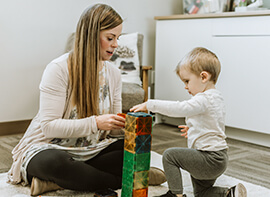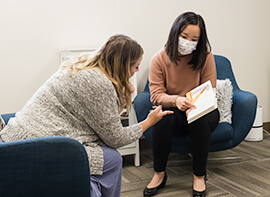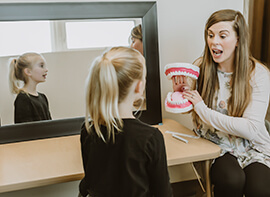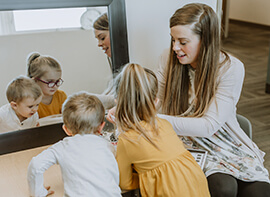
Speech Therapist
Speech-language pathologists or SLPs are involved in the prevention, identification, and treatment of communication and swallowing disorders.
While speech therapists work directly with their clients and patients, they also provide counselling about communication and swallowing challenges, coach family members/caregivers, and create environmental supports.
In Speech Therapy a SLP will work with infants, children, teens and adults in a variety of settings. These settings include homes, hospitals, schools, community health centers, and long-term care facilities.
Speech-Language Pathologists (SLPs)
![]()
Here to support your family through the prevention, assessment, and treatment of communication challenges
We Treat a Variety of Speech Language Areas Including
Speech Sound Delays and Disorders
People can have challenges saying sounds clearly. A speech delay is when sounds are being acquired later than usual. A speech disorder is when the speech errors are atypical or unusual.
Language Skills
Language can be broken down into two parts: expressive language (use of words) and receptive language (understanding of words). Targeted skills include vocabulary, combining words, using proper grammar, understanding directions, answering questions, and much more.
Social Skills
Challenges with playing and socializing can be linked to autism spectrum disorder, however many children can benefit learning about social skills more explicitly. We use Social Thinking programs and concepts to improve conversational skills, turn taking, and cooperative playing.
Literacy
If your child is having difficulties learning to read, we can support them by targeting their phonological awareness skills.
While speech therapists work directly with their clients and patients, they also provide counselling about communication and swallowing challenges, coach family members/caregivers, and create environmental supports.
In Speech Therapy a SLP will work with infants, children, and adults in a variety of settings. These settings include homes, hospitals, schools, community health centers, and long-term care facilities.
SLP Services We Offer
Assessment
If your child is between the ages of 2 years 8 months and 4 years and 8 months, they may qualify for Program Unit Funding (PUF). This grant allows children to access services at their daycare or through a preschool program during the regular school year. We can complete the formal assessments needed to determine eligibility for these services.
At this time, formal assessment services are available only for children up to six years of age.
Treatment
If your child is on a waitlist for speech therapy services at your health unit or school, it can be beneficial to get started with private therapy. Has your child received a block of speech and language treatment at school but is not meeting their goals? You may consider a block of private therapy sessions to achieve these goals more quickly.
Speech Language Therapy Can Help
Some of the Struggles We Can Help Your Child or Teen With:
Articulation/Phonology
Cognitive Communication Disorders
Aural Rehabilitation
Accent Reduction
Augmentative & Alternative Communication
Children with Complex Physical Needs
Language Delay
Social Skills
Apraxia
Autism Spectrum Disorder
Fluency
Voice Disorders
Developmental Disabilities
Oral Motor Speech Delay/Disorder
Literacy
Resonance
Meet Our SLP Team
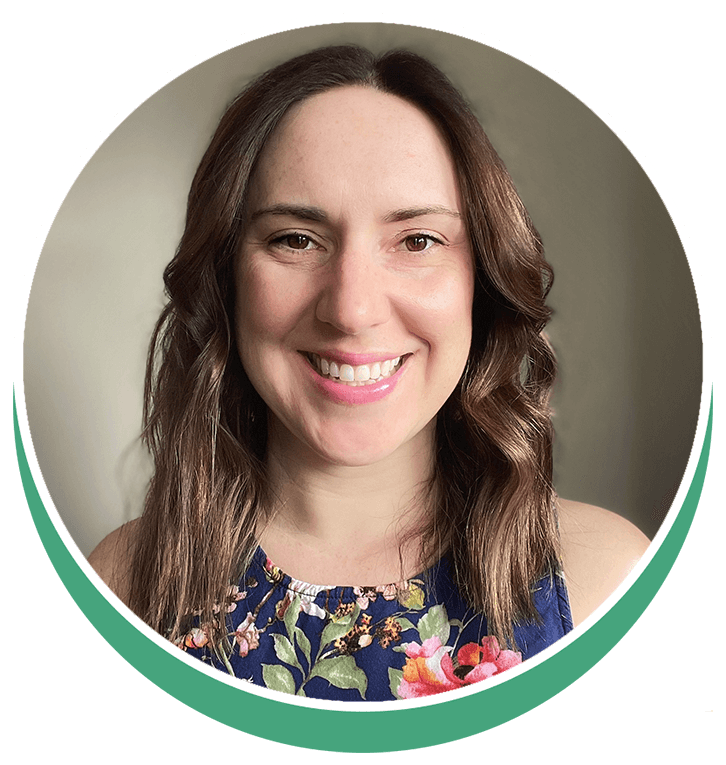
Erica Bilobroka
Speech-Language Pathologist – Edmonton
BSN, MSc, R.SLP, S-LP(C)
Speech Therapy for Children, Adolescents, Teens & Adults
-
Speech Sounds
- Motor Speech Disorders
- Orofacial Myology and Tongue Thrust
- Fluency (i.e. Stuttering)
- Early Language Acquisition and Expansion
- Early Literacy Skills
- Phonological Awareness
- Learning and Study Skills
- Receptive or Expressive Language Delay
Training and Certifications:
- PROMPT+ Trained
- Orofacial Myology: From Basics to Habituation
- Various webinars on the assessment and treatment of Motor Speech Disorders through Apraxia Kids
- Ultimate Play-Based Speech Therapy Certification
- Language Acquisition through Motor Planning (LAMP)
- Trauma Informed Care Certification
- Health Change Methodology Certification
- Indigenous Awareness and Sensitivity Certification
Why did you choose Speech-Language Pathology?
I began University with the intention of becoming a Pharmacist but quickly realized it wasn’t going to be a fulfilling career for me. Heading into my third year of my undergraduate degree, I started to explore the idea of becoming an SLP and did some volunteer work/clinical observations of an SLP in my hometown. Observing my very first session behind the two-way mirror, my heart and soul lit on fire! I knew that I had found the career that would never feel like work. I pursued Speech-Language Pathology from that moment on and have never looked back!
What ages of clients do you treat?
I have extensive experience working with school-aged children; however, I love working with kids of all ages and have also recently discovered joy working with young adults who are interested in improving their speech and/or oral rest posture.
Learn more about Erica
I received my Bachelor of Science from the University of Alberta in 2008 and immediately pursued my Master of Science in Speech-Language Pathology, graduating in early 2011 from the Thesis-track. Since that time, I have worked in a variety of preschools, schools, and families’ homes with children aged 2-18. It is such a joy to work with families, building strong connections and getting to witness the excitement and pride that comes when communication breakthroughs are made. I truly feel so blessed to be entrusted with your loved ones and am grateful for every family that walks through my door. My goal is to make speech therapy fun, functional and engaging for your family!
When not at work, you will find me spending time with my husband and 2 children (4 & 6.5). We love to build Lego, swim, take family walks and explore our community playgrounds. I also love to read, take dance class, travel, and spend time with extended family and close friends.
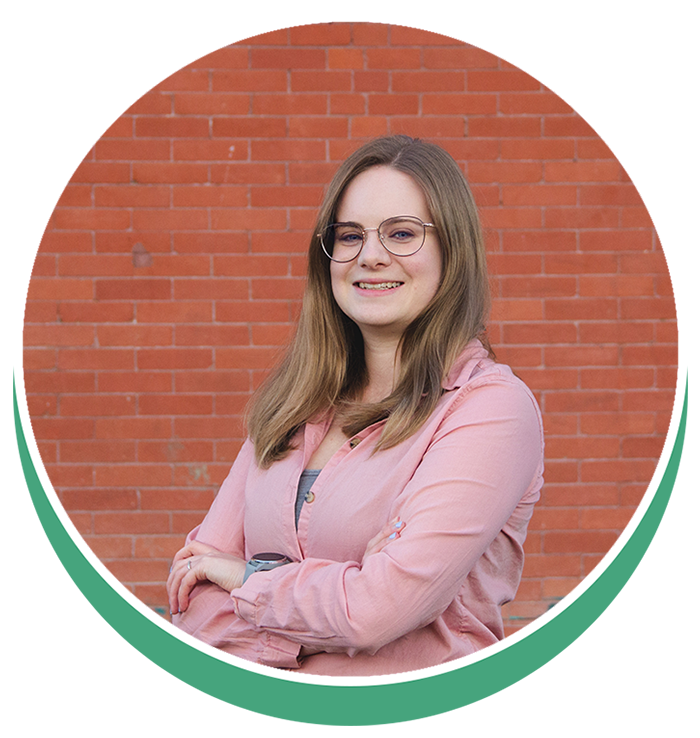
Emily Cipkar
Speech-Language Pathologist – Sherwood Park
M.Sc., R.SLP
Speech Therapy for Children, Teens, & Adults
-
Speech Sounds
- Motor Speech Disorders
- Receptive or Expressive Language Delays
- Early Language Acquisition
- Augmentative and Alternative Communication
Training and Certifications:
- Certificate in Francophone Practice for SLPs
- Natural Language Acquisition/Gestalt Language Processors (Meaningful Speech course)
- Non-Violent Crisis Intervention Training
- Trauma-informed Care training
- Pivotal Response Treatment Level 1 & Level 2
- PEERS for Adolescents Online Provider
- Various webinars on Augmentative and Alternative Communication (AAC) best practice guidelines
- Various webinars on neurodiversity-affirming approaches
Why did you choose Speech-Language Pathology?
I have always had a passion for helping and teaching others. While I was completing my undergraduate degree in French Studies, I realized that I really enjoyed learning about linguistics and the particulars of language and speech. Through that discovery, and the passion for teaching others, I came across the profession of Speech-Language Pathology, and realized it hit all my boxes!
What ages of clients do you treat?
I have most of my experience working with preschool and school-aged children, but I have facilitated groups for teenagers, and I enjoy working with them equally.
Learn more about Emily
I received my Bachelor of Arts in French Studies, with a minor in psychology, at the University of Windsor in 2017. Originally from Ontario, I moved here in 2017 to complete my Master of Science with the University of Alberta, finishing in 2019. Shortly afterwards, I completed the graduate certificate program in Francophone Practice for SLPs. My approach to treatment is to find the most functional goals for the client and family, and work with them to accomplish it. I enjoy making treatment fun and engaging, keeping in mind the client’s strengths. I am a strong advocate for a client’s communication needs, using their preferences for how they communicate with the world.
When not at work, you’ll find me spending time with my spouse and cats, or diving into my latest craft hobby. I enjoy knitting, crocheting, sewing, embroidering, or anything that helps pass the time!
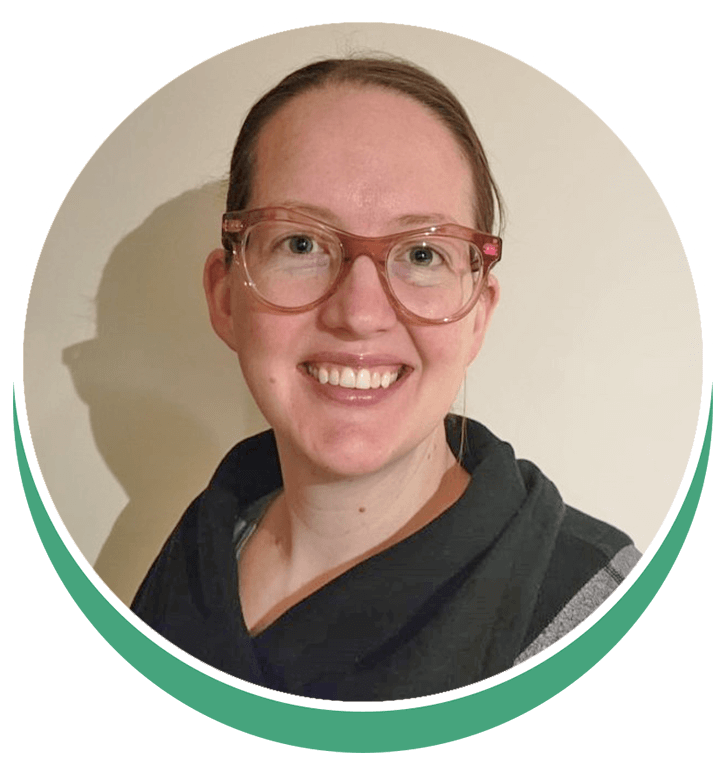
Carin Broome
Speech-Language Pathologist – Edmonton
MSc.SLP, R.SLP, S-LP(C)
Speech Therapy for Children, Adolescents, Teens, & Adults
-
Speech Sounds
- Motor Speech Disorders
- Oral Motor Delays/Disorders
- Pediatric Feeding Disorders
- Infant Feeding
- Picky Eating
- Orofacial Myology and Tongue Thrust
- Pre and post frenectomy care
- Early Language Acquisition and Expansion
- Early Literacy Skills
- Receptive or Expressive Language Delay
Training and Certifications:
- PROMPT Bridging Trained
- IAOM – 28-hour Certification-Track Course
- Talk Tools ® – OPT™ Level 3Therapist
- Functional assessment and remediation of Tethered Oral Tissues
- Breathe Baby – The Breathe Institute
- Feed the Peds
- Myo Munchee
- The Floortime Course for Professionals
- Pivotal Response Treatment Level 1 Certification
- Hanen Certification in: It Takes Two to Talk, Learning Language and Loving It, Target Word, More Than Words, Talkability, ABC and Beyond
- American Sign Language Level 1 and 2
- “The Invisible Disability” Sensory Processing Disorder
- Various webinars on pediatric feeding disorders
- Language Acquisition through Motor Planning (LAMP)
- AAC Ally
- Various webinars and courses related to Augmentative and Alternative Communication (AAC)
About Carin:
I graduated from the University of Alberta in 2011. Since then, I have worked in a variety of settings including schools, community centres and families’ homes. I have a passion for helping children express themselves in a way that is meaningful and functional for them. I believe that children learn best through play and incorporate strategies into play and daily activities. I am also passionate about supporting children and adults to eat safely and enjoy food. The relationship between speech and feeding development is a special interest area and one that I love supporting children and families develop. I also value looking at the whole person and providing appropriate referrals to other disciplines to help everyone reach their potential.
When not at work, I am spending time with my husband and 3 kids (18, 16 and 8 months), watching musicals, trying new restaurants, and planning our next vacation.
How Do I Know if My Child Needs A Speech Therapist?
How Do I Know if My Child Needs Speech Therapy?
Children develop at their own rates and it can be difficult to detect if your infant or toddler has a speech or language problem. If you suspect a problem, consider booking an appointment with our speech pathologist. It is never too early to start working with a SLP as children under the age of two can be helped with speech and language development. Speech and language difficulties that are not treated can affect behavior, social interaction and future academic success. Early detection is extremely important!
Milestones for Children from Birth to Age 5:
* Credit to ASCLPA for the chart information
| Milestones | Warning Signs |
|---|---|
| Startled by loud noises | Your baby does not react to sounds |
| Soothed by calm, gentle voices | |
| Likes to cuddle and enjoys being held | |
| Cries, gurgles, grunts, says “ah” | |
| Sucks and swallows well |
| Milestones | Warning Signs |
|---|---|
| Watches your face when you talk | Your baby does not respond to your smiles and interactions |
| Tries to “talk” with you by cooing or babbling | |
| Enjoys “talking” with you and smiles at you | |
| Coos and squeals for attention | |
| Has a special cry when hungry |
| Milestones | Warning Signs |
|---|---|
| Understands some common words when used with gestures, such as their name, “bye-bye”, “up” and “give me” |
Your child does not babble or try to talk |
| Copies gestures (e.g., waving bye-bye) | Your child has stopped babbling |
| Likes to cuddle and enjoys being held | Your child has had several ear infections |
| Mimics different speech sounds, like “oh oh” and “wheee” | |
| Babbles using a variety of different sounds, such as “bababa dididi upup bupbupbup |
| Milestones | Warning Signs |
|---|---|
| Understands simple questions/statements such as “Where is your nose?” and “Give me” | Your child does not talk at all |
| Nods “yes” and shakes head for “no” | Your child does not interact with others |
| Points to show interest in something or to ask for something | |
| Takes part in imaginative play, such as pretending to go to sleep or putting toy phone to ear | |
| Babbles using a variety of sounds which, when put together, sound like real sentences | |
| Says a few words, although they may not be clear |
| Milestones | Warning Signs |
|---|---|
| Understands simple questions, such as “Where is mommy/daddy?” and “Where is your shoe?” | Your child does not talk or uses more gestures than words |
| Understands simple directions (e.g., “Get your blanket”) | Your child does not appear to understand simple directions. |
| Understands more words than he/she can say | |
| Makes requests (e.g., food, toys) | |
| Says some two-word sentences, such as “more juice,” “no night-night,” “daddy car” | |
| Says “whatssat” a lot at about age two |
| Milestones | Warning Signs |
|---|---|
| Answers simple questions, such as “What’s your name?” and “Which one is the big doll?” | Your child shows frustration when trying to talk |
| Follows simple directions (e.g., “Put the teddy bear to bed”) | Your child’s speech is difficult for you to understand |
| Puts a toy “in”, “on” and “under” when asked | Your child does not yet put two words together |
| Has a word for almost everything | Your child stutters |
| Uses two- to three-word “sentences” to talk about and ask for things (e.g., “That my truck”, “Puppy eat cookie”, “Doggy kiss me”) |
| Milestones | Warning Signs |
|---|---|
| Understands questions about a picture story (e.g., “Where did the bunny go?”) | Your child’s speech is difficult for strangers to understand |
| Follows two related directions such as “Close the book and give it to me” | Your child has difficulty playing imaginary games with others |
| Gives directions (e.g., “Fix this for me”) | Your child stutters |
| Uses a lot of sentences that have four or more words | |
| Asks many questions, like “what”, “where” and “why” |
| Milestones | Warning Signs |
|---|---|
| Follows three related directions, such as “Get your crayons, make a picture and put it on the counter” |
Your child does not use complete and grammatically correct sentences |
| Understands concepts such as “top”, “bottom,” “beside” and “behind” | Your child stutters |
| Tells stories and shares ideas about recent events | Your child does not seem to be able to follow directions |
| Explains the meanings of words when asked | |
| Says most sounds correctly (except for l, r, th, ch, sh) |
Warning Signs for Children in Early Elementary:
* Credit to ASCLPA for the source information
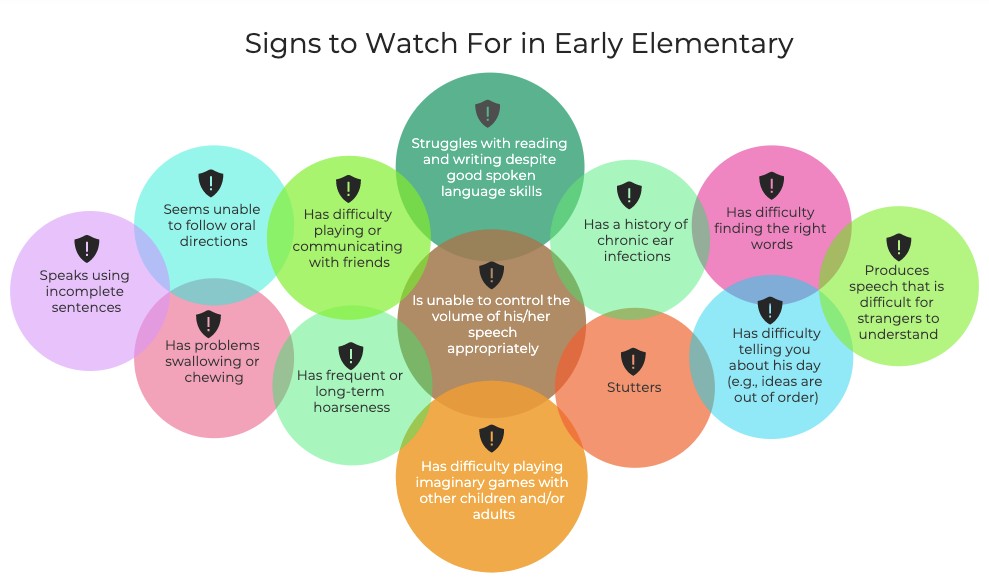
If your child is not meeting several milestones or is demonstrating any of the warning signs, they may benefit from speech language therapy.
We would love to help you see your child succeed with speech-language pathology.
Please contact us with any questions or book an appointment online today.
21
Team Members
2K+
Patients Treated
30
Kids Between Us
Send Us a Message
Please fill out the form below and we will get back to you.
[contact-form-7 id=”8″ /]


